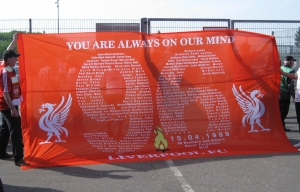
Hillsborough and the policing of working class sport
Professor Michael Lavalette argues that the police treament of working class fans at Hillsborough, and the subsequent extensive cover ups, were typical of the way working class communities - particularly young people, black and Asian people, and striking workers at Warrington, Wapping and Orgreave - were policed in order to 'protect the dominant order'.
15 April 1989 - a day that will always be remembered in Liverpool. In 1989 I was living in Glasgow. On that sunny Saturday afternoon I was at a meeting and returned home in the late afternoon to be met with the horrific pictures being broadcast on BBC of the disaster in Sheffield. The following afternoon I made my way to Hampden Park to watch a Scottish Cup semi-final. The atmosphere was very subdued and the minute's silence before the game was one of the most moving I have ever been part of.
This takes some explaining. Football has had its share of tragedies. In my home city, the Ibrox Disaster of 1971 left 66 Rangers fans dead after a stair way collapsed at an Old Firm game. In 1985 the horrific fire at the Bradford Valley Ground left 56 dead, and the Heysel disaster saw a wall collapse and 39 people die at the European Cup final, involving Liverpool.
But almost from the beginning Hillsborough felt different. In the years running up to Hillsborough football fans had increasingly been a crowd who had to be controlled. We were marched from train stations to grounds. Held for long periods after matches finished. Always treated as a problem – a potential threat to order. This in itself has to be put in a wider context. Sure part of the discourse of the 1970s and 1980s was about football ‘hooligans’. Yes, sometimes too much alcohol was drunk. Yes, at some grounds, the far right were trying to organise and needed to be stopped. Most of the time, however, most of us who went to games went along to avoid trouble and watch the match. But during the 1980s the police were increasingly used as an almost paramilitary force against workers and working class communities.
They harassed black and Asian communities through stop and search and SUS legislation. Young kids – black, white and Asian – were targeted and ‘moved on’ for all manner of minor misdemeanours. And workers on strike were met with orchestrated violence. At Eddie Shah’s plant in Warrington, throughout the miners’ strike of 1984/85 and at Wapping in London, police violence knew no bounds. For any of us who were at those picket lines, we knew the police acted with impunity. Whether it was snatch squads sent into the crowds, police cracking skulls with truncheons and shields or mounted officers on the rampage, they were given license to treat organised groups of workers as they wished. The treatment of working class football fans was just another example of the police's role as protectors of the dominant order.
But what about the football? Well this was the pre-Premier League days. Football entry prices were cheap, but the conditions were, frankly, awful. When you went to the grounds they were in a dreadful state. Open terraces were exposed to the elements, and were dominated by broken concrete or sometimes ash that turned to mud in the rain. Forced into ‘pens’, you were treated like caged animals. And as for toilet facilities, the least said the better.
The directors of clubs didn’t make a fortune, like they do today, but they were a ‘class apart’. They drank expensive wines, champagnes and whiskeys in the Board rooms, ran the clubs in near- dictatorial ways and thought of most fans as, at best, the great unwashed. As to the politicians, well this was the 1980s. Under successive Thatcher governments large crowds of working class people were to be treated as a threat. Football was viewed as a sport followed by ‘hooligans’ and cities (especially northern cities) as centres of opposition. Remember in the years before Hillsborough Thatcher had battled Liverpool City Council (then under the control of the Militant Tendency within the Labour Party) over their right to spend local money on local services.
These factors form the social context within which the Hillsborough disaster took place. But they also explain why Hillsborough and the 96 became important to all football fans – not just Liverpool supporters: football fans across the country knew that what happened to Liverpool fans could have happened to any of us. What we didn’t know on that fateful weekend was the extent of the cover up that was about to take place to cover the crimes of the powerful. We couldn’t have predicted the lies and abuse that would be heaped on supporters and their families by those in Government, by sections of the press and by official spokespeople of the police and ambulance services.
Perhaps even more shocking was the ‘independent’ review undertaken by West Midlands Police, that backed up the lies and the cover up of their chums in Yorkshire. And these were lies that both forces continued to repeat right up until the verdict last week. Those lies might have stuck if it had not been for the resilience and fortitude of the families. They fought against almost insurmountable odds to defend the memories and reputations of their loved ones. They deserve the utmost respect. Their determination to speak truth to power offers a shining example to us all.

